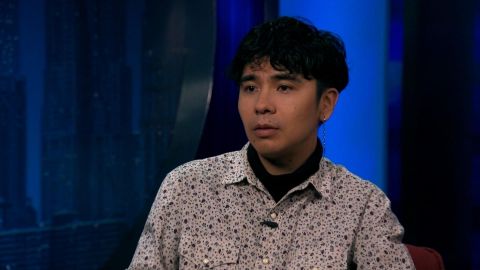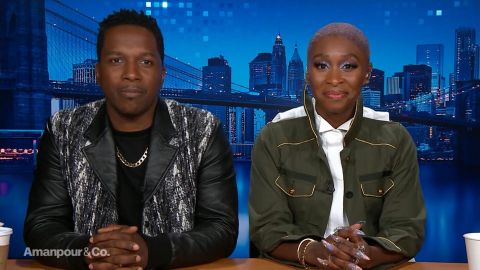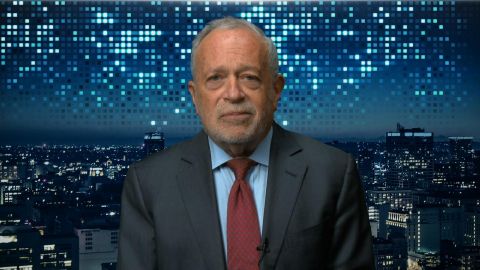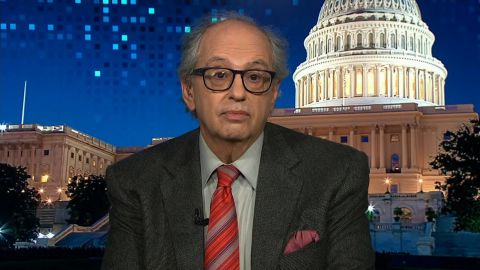Read Transcript EXPAND
CHRISTIANE AMANPOUR: Now, we move to one of the most compelling and magnetic literary talents of recent times. Ocean Vuong is an award-winning Vietnamese-American writer born in Ho Chi Minh city and the grandson of a U.S. soldier. Vuong and his family were forced to immigrate to the United States when he was 2 years old. His debut novel released this year, “On Earth, We’re Briefly Gorgeous,” spent six weeks on the New York Times’ best seller list. Semi-autobiographical, it’s written in the form of a letter from a young Vietnamese-American to his illiterate mother. And he spoke to our Michel Martin about the force behind his creative spirit.
(BEGIN VIDEOTAPE)
MICHEL MARTIN, AMERICAN JOURNALIST: Ocean Vuong, thank you so much for talking with us.
OCEAN VUONG, AMERICAN POET: Thank you, Michel. Pleasure to be here.
MARTIN: And congratulations on everything.
VUONG: Thank you. Thank you. It was a pleasant surprise all of it.
MARTIN: The book tells the — I guess, how would I say the coming of age story of a character who is very much like you —
VUONG: Yes.
MARTIN: — comes here as a young boy. He’s trying to understand his gender identity, he’s trying to understand his sexual identity. He’s trying to understand this world that he’s been kind of dropped into. Is this your story? Is this autobiographical?
VUONG: To an extent. I was inspired by — I had good elders in literature. I was inspired by Baldwin’s “Go Tell It To The Mountain.” Baldwin said he had to write that book in order to write anything else and it made perfect sense to me because what he was doing was saying that the (INAUDIBLE) that raised him, a black family in Harlem, similar to a Vietnamese family in Hartford for myself, is something worthy and of the dignity and the power of literature. And I think he wrote that to prove to himself, America, his community, that this could be in the center. You can use your imagination to tend to yourself and your communities to empower them. Not necessarily be a representative of them, but empower them to say that, this is right up there with any other novel in this country, every other story. And to use a life that was recognizable to me. Asia America life working out of poverty. Within poverty in Hartford was a powerful moment for me to say this life that many people just pass on the freeway, this life gave me my imagination. In the same way Harlem gave Baldwin his.
MARTIN: You were a baby when you came here, right?
VUONG: Yes. Yes.
MARTIN: Do you have any memories of coming here in those early years?
VUONG: My first memory was listening to music. And particularly in Hartford. I lived in a black and Latino neighborhood and I didn’t know America was mostly white folks, for a long time.
MARTIN: Really? You thought it was black and Latino.
VUONG: Yes.
MARTIN: Because you live in Hartford, Connecticut.
VUONG: Hartford, Connecticut. And it was so vibrant, there was so much life, there was so much joy and music. It’s a rough city, but we were immigrants from war, we were refugees so violence was something everybody understood. And so we sought out the pleasure and the community really took us in.
MARTIN: Do you remember anything that your mother and grandmother talked to you about America? Do you remember anything they said to you about your story, your journey, how you came to be there?
VUONG: It was all warnings. And I think a lot of folks of color get this from their elders. Unexplained warnings and my warning was, don’t draw attention to yourself. You’re already Vietnamese. That’s one strike against you. And it’s a precarious condition to step out into the world with one strike against you and that your goal is to be invisible. That’s very strange for a mother to tell a child, disappear, go out — you go on and go out there and disappear. And what I realize is they were trying to protect me. If you stay out of the limelight, you can get by, do your work, make a living quietly. And that’s the greatest paradox between first and second generation because the second generation wants to be known. We’re here. We’re proud. We want to honor our journey but the elders tell us it’s time to hide yourself in order to protect yourself and that’s the great conundrum of being an immigrant. And I think we don’t have to solve that. We can honor both perspectives.
MARTIN: Do you remember though when you developed that yearning to be seen, to be known?
MARTIN: Right away. I’ve never been put in time-out. I was 6 or 7. Teacher put me in time-out. And I was so invisible, she forgot about me. The students left and when — and I just sat there. You know, I’m sitting in the corner and then she looked up, she was eating lunch. She looked up for her macaroni salad and she said, oh, my God, what are you doing here still? And I thought it’s so easy for a small yellow child to vanish that the hard work, the real work that requires innovation is to be known. And one of the best and most perennially powerful ways to be known is to be an artist.
MARTIN: Do you remember when you started thinking about writing or something making art? Something to create a space for yourself? Do you remember that?
VUONG: I tried. But it was — it was not encouraged. My family is illiterate and it took me a long time age 10, 11 to really start reading fluently.
MARTIN: And forgive me, you’re saying your family’s illiterate in both Vietnamese and English?
VUONG: Yes. Dyslexia and lack of, you know, foundational education. I would sneak out of recess, stay in the library to listen to tapes of famous speeches. And one of those was Martin Luther King. And you could hear the static when he was giving the “I have a Dream” speech. And I thought it was snowing. It sounded like snow to me. And I said, who is this man talking about dreams in a snowstorm? It felt so powerful and surreal. But it was not different than what my grandmother would tell at home. She would tell folktales, mystical journeys and folklore from Vietnam and I thought this was what story telling was like. And it was so powerful to me. As a little lonely kid in Hartford listening to a library tape that I tried to write my own poem. But my teacher thought I plagiarized because I was a poor student. My grandma was bad. My — I couldn’t even say the word “the” well. So he thought, oh, this ESL student must have clearly snatched this from somewhere else and he dumped my desk out and he says, you know, where did this come from? And it was terrifying to be in trouble for your imagination. But that’s a moment where I said he respects me though. You respect what I did. I’ve never been so respected to the point of being feared. To being unfathomable. And I think when it comes to Asian-American talent in this country, a lot of us are unfathomable. When you think about the two stereotypes of Asian-American talent, one, the math whiz. Two, the musical prodigy. When it comes to the math whiz, it’s genetic. They’re born like that. That’s the big stereotype. Or they only have it through the unjust parenting of tiger moms, right? So they have it only through this inhumane parenting and regiment, but it’s not their own talent. Their own agency. When it comes to the musical prodigy, there’s a great violinist, a great pianist, but always in service of Bach, Beethoven, Mozart, euro centric music. So at its best to be an Asian-American artist of talent is to be merely a fine tune instrument in service of somebody else’s name then. So to be a novelist, to be a poet, a dramatist, a painter, to be an Asian- American artist making your own thing, the only result would be you’re inconceivable.
MARTIN: Are you angry about the way you were treated as a child?
VUONG: I think I feel it, but I don’t act out of it. I think one thing living with elders with PTSD, living in a black and brown community where violence was pervasive, where police brutality was pervasive, I saw that anger was the death of creativity and innovation. And I think as a writer, as a thinker, I’m most useful to myself and to my world when I ask now what? What can I do now? That’s where I’m most useful and I tried to write my books out of that question.
MARTIN: Will you read a little bit for us?
VUONG: Yes.
MARTIN: Here’s a passage, I think, we both agree we would like to hear you.
VUONG: OK.
MARTIN: Thank you.
VUONG: The most common English word spoken in the nail salon was sorry. It was the one refrain for what it meant to work in the service of beauty. Again and again, I watched as manicures bowed over a hand or foot of a client, some young as 7, say I’m sorry. I’m sorry. I’m so, so sorry. When they had done nothing wrong. I have seen workers you included, ma, apologize dozens of times throughout a 45-minute manicure hoping to gain warm traction that would lead to the ultimate goal. A tip. Only to say sorry any way. When none was given. In the nail salon, sorry is a tool one uses to pander until the word itself becomes currency. It no longer merely apologizes, but insist reminds I’m here, right here. Beneath you. It is the lowering of one’s self so that the client feels right, superior, and charitable. In the nail salon, one’s definition of sorry is deranged into a new word entirely. One that’s charged and reuse as both power and defacement at once. Being sorry pays. Being sorry even or especially when one has no fault is worth every self-deprecating syllable the mouth allows because the mouth must eat.
MARTIN: You sure you’re not angry?
VUONG: I’m angry. Of course. But I don’t write with rage. I can’t. I think rage and anger are energies. They’re raw energies, ready to be recycled and reused. But if we use them, anger is a force that extinguishes the welder as well as the world. I’m more interested in using the energy of compassion and understanding. I’m at my best when I say I’m angry about this, but I need to know why you’re doing it to me.
MARTIN: One of the things I think many people appreciate about your work in addition to your beautiful language and your sharp observations is that you’re also very honest. I think about some of the dynamics within your own family. At least as described in the book. And there was brutality there. If you don’t mind my saying that there are many ways that your mother treats you that are very difficult to read. And to think about your experiencing. And I have to ask you, what do you think about that?
VUONG: I think writing helped me understand that although you can technically be a victim, you can be a victim of war. You can be a victim of domestic violence, child abuse, but whether you live in victimhood or not, is up to you. We can’t change what happens to us. But we can change how we live in order to have a successful life. And I think one of the great power of writing is that when you can take your story and present an alternative future for where it was headed, you ultimately take control of your life. And, yes, we all experience terrible things. You know, the women in my family suffered from war. The poison of war entered them. They passed it down to me. And I like to see it as this is our species wide endeavor is how do we change what happened to us into how we live better has the great, great conundrum.
MARTIN: What’s your relationship with your mother now?
VUONG: It’s quite beautiful. You know, I never thought it would be this lovely. What I learned from these refugee women is that you don’t have to talk it out. That’s the great western myth. You know, you’ve got to talk it out. You’ve got to get a therapist. Lay it all out. And I think when I see them, they’re more invested in the present. The wounds are understood, and sometimes language can’t even hash them all out. They taught me that despite what happened, I can still be of use to you. So when I see her, it’s, are you hungry? What can I do? There’s a wisdom in accepting what happened is beyond your control. They never ask for their country to be bombed. They never asked to have terrible husbands who abuse them. But what they can do is say regardless of what happened, I care for you and I’m going to find a way to keep caring for you. That’s what I learned.
MARTIN: Did you ever meet your, I guess your grandfather, right? Who was a white American soldier, right?
VUONG: Yes.
MARTIN: You’ve met him. What does he think of your work?
VUONG: It’s a challenging relationship. It’s an amicable one. But it’s also one where there’s so much guilt on both sides. You know, we don’t ask to — it’s rare and challenging when the elephant in the room is always a war that costs four plus million lives.
MARTIN: But there’s a poem that you wrote about that, which I cannot say on this air because of there’s some language in it that I can’t repeat, but it’s basically the concluding line is, no bombs, no me. Right?
VUONG: I am the direct product of war. And I think the opportunity there, although it’s very fraught, is that within a mixed race family that comes out of war, there’s no way to keep it simple. And I think that’s why the book and my thinking moves more like a spiral. I moved through history and observations like a spiral. I keep returning and double checking. And that comes from having a very complicated history without the Vietnam war, this horrific, this black page in American history, I wouldn’t be here talking to you. How do you grapple with that? You can’t say that’s good or bad. You have to say the next thing, which is why did it happen? And how do we avoid it?
MARTIN: You’ve spoken a number of times in our conversation about just the experience of being Asian and American and what is expected of you as an Asian-American artist, but what about your sexuality and your understanding of that. How does that factor into this story?
VUONG: Right. I wanted to address these tropes of shame around queerness and sexuality. And the thing that I wanted to portray was that, you know, little dogs relationship with this white farm boy portrays the difference in how they approach shame. Trevor, the farm boy, is incredibly ashamed of his queerness because it is the antithesis, the absolute antithetical identity of what American masculinity is. And he in a way crumbles from it. He loses himself literally. Because he can’t be a man, if he’s not a man, he’s not human under American standards. Whereas little dog having been raised by Vietnamese women was much more comfortable with the sexuality. His family understood, we — they come from a different tradition where there was more malleability in sexuality. And in fact, he’s better off in his queerness than this American boy who is supposed to have everything, including ultimate freedom.
MARTIN: “On Earth We’re Briefly Gorgeous,” before I let you go, tell me about the title. It’s a beautiful title. So many of your senses are beautiful. What does this mean?
VUONG: I think for me, I dared to call poor black and brown and yellow bodies gorgeous. It felt like here’s my chance to say it out the gate. The first sentence in the book is the title. And I want to start with beauty, because that’s a given to me. That’s a fact. These people are beautiful. And I want to start with there and show then show the world how they’re beautiful.
MARTIN: Ocean Vuong, thank you so much for talking with us.
VUONG: Thank you so much.
About This Episode EXPAND
Norman Ornstein joins Christiane Amanpour to give a glimpse into the inner workings of Congress as the impeachment inquiry unfolds. Robert Reich examines PG&E’s role in the California fires. Cynthia Erivo and Leslie Odom, Jr. discuss their roles in the new film “Harriet.” Ocean Vuong sits down with Michel Martin to discuss race, sexuality and his new novel “On Earth We’re Briefly Gorgeous.”
LEARN MORE



